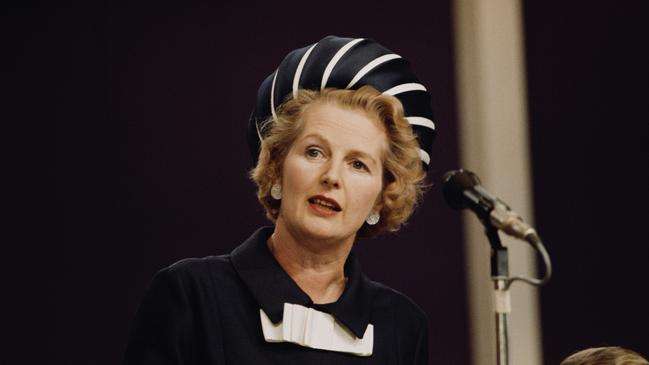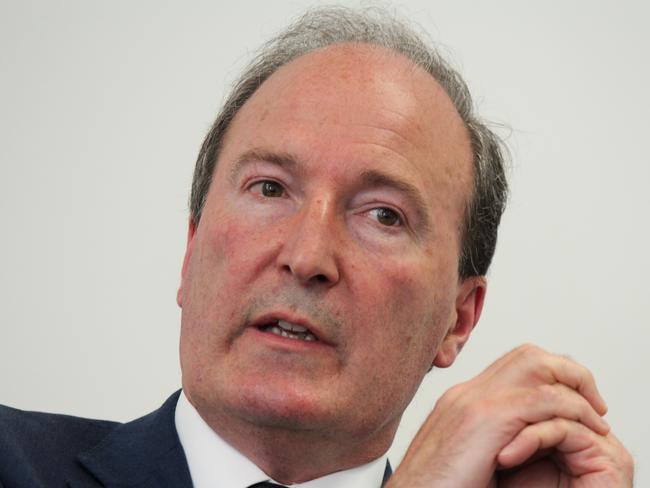Witness to the iron throne
Charles Moore took 20 years to write the biography of former British PM Margaret Thatcher. And he needed every second.

Charles Moore acknowledges being somewhat daunted when offered the opportunity to write the “authorised” life story of one of the most influential, consequential, polarising and, in many ways, enigmatic, figures of the 20th century: Margaret Thatcher.
“Yes, I was daunted, but not because of the admirers or detractors — that was an added attraction because it was part of the interest of the subject — I was simply daunted by the scale of the task,” Moore, 63, tells Review.
Thatcher was a giant of British politics. She was the first woman to become prime minister. She led the Conservative Party to three election victories. She was prime minister from 1979 to 1990 — the seventh-longest-serving overall. She governed through a period of domestic and global upheaval. And her legacy remains a matter of fierce contention, before and after her death in 2013.
It is not surprising that this huge life required three mammoth volumes totalling 2688 pages to chronicle it. With a mountain of official documents to read, hundreds of people to talk to and a surfeit of other books and articles to review, it took Moore more than 20 years to complete the monumental project. The first volume was published in 2013, the second in 2015 and the third last year. He initially envisaged two volumes.
Moore was editor of London’s The Daily Telegraph when commissioned to write the biography in 1997. He soon realised the task was so huge and consuming that he stepped aside from an executive role with the paper to focus on writing the books. Although Moore covered Thatcher as a journalist, and they had a good relationship, they were not especially close. This was one reason, he suspects, why he was chosen as her authorised biographer. He was also a generation after her and was not an academic historian. These things also worked in his favour.
Any biographer writing about somebody who is alive, as Thatcher was when this biography began, must reach an understanding with their subject about co-operation. It is foolish to write a book about somebody who is alive without any degree of assistance. Given this was to be an authorised biography, Thatcher’s co-operation was expected but ground rules still needed to be established.
“I had to have access to everything, because you can’t be an authorised biographer if you are debarred from things,” Moore says. Nothing was to be off limits if this was to be a credible work of biography. That meant interviews on any topic and documents had to be made available. Thatcher agreed.

Thatcher, who was known for her rather brusque approach to journalists, went further. She insisted on not being allowed to read the book and nor should it be published in her lifetime. This was a condition for the commission. This seems an uncharacteristic approach for The Iron Lady.
“She did that because otherwise people would think she was trying to control it,” Moore explains. “So that was very important for its historical reputation and for its reputation as history — that it is not her version, it is her full biography.”
This was an insight into Thatcher’s personality. She was not introspective. “Hers was a life with no space for self-examination,” Moore writes. Thatcher often bristled when asked about her family or quizzed about her background, personal philosophy or political trajectory. She lived for the present and seldom dwelled on the past.
“I didn’t think she would try to vet every word, because she wasn’t pedantic and she wasn’t a control freak, but I did think she would wish to influence me,” Moore says. “I realised that she fundamentally wasn’t interested because she felt: ‘I’ve done it and somebody else can write about it.’ She was always looking at the next thing, not looking back, and that was a very important part of her character.”
But there was another reason Thatcher did not want to read the manuscript. “I think she sensed it would give her pain in some places,” Moore suggests. “She had a romantic view of history. Some of the things I had to write would have been most disagreeable to someone who valued her personal space and believed passionately in her record.”
In considering the craft of biography, Moore pays tribute to two towering practitioners: the late Martin Gilbert, who co-authored Winston Churchill’s biography, and Andrew Roberts, another Churchill biographer, who has also tackled Lord Halifax, Napoleon Bonaparte and The Duke of Wellington, among others.
But, like all writers, Moore had to find his own method. He preferred to research, interview and write as he went rather than doing lengthy periods of information gathering and then sitting down to write. “That is not the right approach for a project of this scale, because if you were to do that you would forget half of what you’d done as you went along because you’d be waiting so long before you wrote,” he says.
Moore’s technique, he says, is more like that of a crime writer. “You do a lot of preliminary work but while you are writing you continue to interview people or find new documents or look again at old documents because you’ll really be on the trail now — it’s like pursuing a crime and finding the clues, and then you assess it all as you write, chapter by chapter,” he says.

The result, after three hefty volumes, is a tour de force of biographical research, analysis and narrative. While the books are sympathetic to her achievements and historical impact, Moore brings a discerning judgment to her failures and overall legacy. Although an authorised biography, it is an even-handed and not uncritical account of an extraordinary life.
There are surprises that run counter to the established narrative that Thatcher constructed in two volumes of memoirs, The Downing Street Years (1993) and The Path to Power (1995). One of the most remarkable discoveries is that she had several boyfriends before Dennis Thatcher, who each had a formative influence on her, and one even proposed marriage.
Moore writes about Thatcher’s capacity to absorb information without becoming lost in detail, her communication skills in being able to translate complex issues into simpler explanations and her work ethic and focus. She had a good sense of timing and, like all effective politicians, knew when to advance and when to retreat on an issue. That is, until the poll tax that hastened her demise. Indeed, many of her strengths later became weaknesses. The Conservatives trailed Labour, led by Neil Kinnock, in every poll during her final 18 months in power. In assessing her legacy, Moore argues that her government was a turning point for Britain. She played a key role in ending the Cold War with victory for the West. Second, her economic reforms were important in revitalising the British economy, although government spending was not reduced as much as she made out. And, thirdly, she pioneered a model of strong, conviction-based, uncompromising leadership, Thatcherism, which has its admirers and critics.
One of the most interesting aspects of the biography — and it is a theme throughout — is how Thatcher saw her gender as a political disadvantage but never a weakness. She knew there were no second chances for women in politics; they were judged more harshly and unforgivingly than men. It helps to explain why she was a perfectionist and worked exceedingly long hours. Moore writes that “sex isolated her in her political career”. Thatcher found it lonely being a woman in politics. (And in her personal life too.) But she was not self-pitying about it. She accepted it as the way politics was.
Moreover, she managed to turn it into an advantage. Indeed, she was brilliant at exploiting her image for political purposes. Being a woman made her stand out. She was interesting. And, for some, she had sex appeal.
“As the one and only woman, she understood how that played visually, theatrically, rhetorically and how it fascinated people what she wore, what her hair looked like, what her voice was like and what gestures she made,” Moore explains. “Her handbag became a symbol of power. She turned the idea of women as weak upside-down. It became the symbol of her authority.”
But her isolation contributed to her demise when she decided not to recontest a second-round leadership ballot after being challenged by Michael Heseltine, and resigned. Moore writes about Thatcher’s disdain for the men who sat around her cabinet table. Heseltine, like Nigel Lawson and Geoffrey Howe, became contemptuous of her arrogance and disrespect for colleagues. When Thatcher departed, her vulnerability was evidenced through tears. Moore insists she was not cold and detached. When the end came, she felt hurt and betrayed. She had won more votes than her challenger and successor, John Major, in that leadership contest. And she never lost a general election. “She wanted to call her memoir Undefeated because she was, literally, never defeated,” he says.
Charles Moore ’s Margaret Thatcher: The Authorised Biography, Volume Three: Herself Alone is published by Allen Lane.
READ MORE: No bounds: Turnbull unloads on anyone in his controversial and compelling memoir | Anybody out there? Art without audiences


To join the conversation, please log in. Don't have an account? Register
Join the conversation, you are commenting as Logout